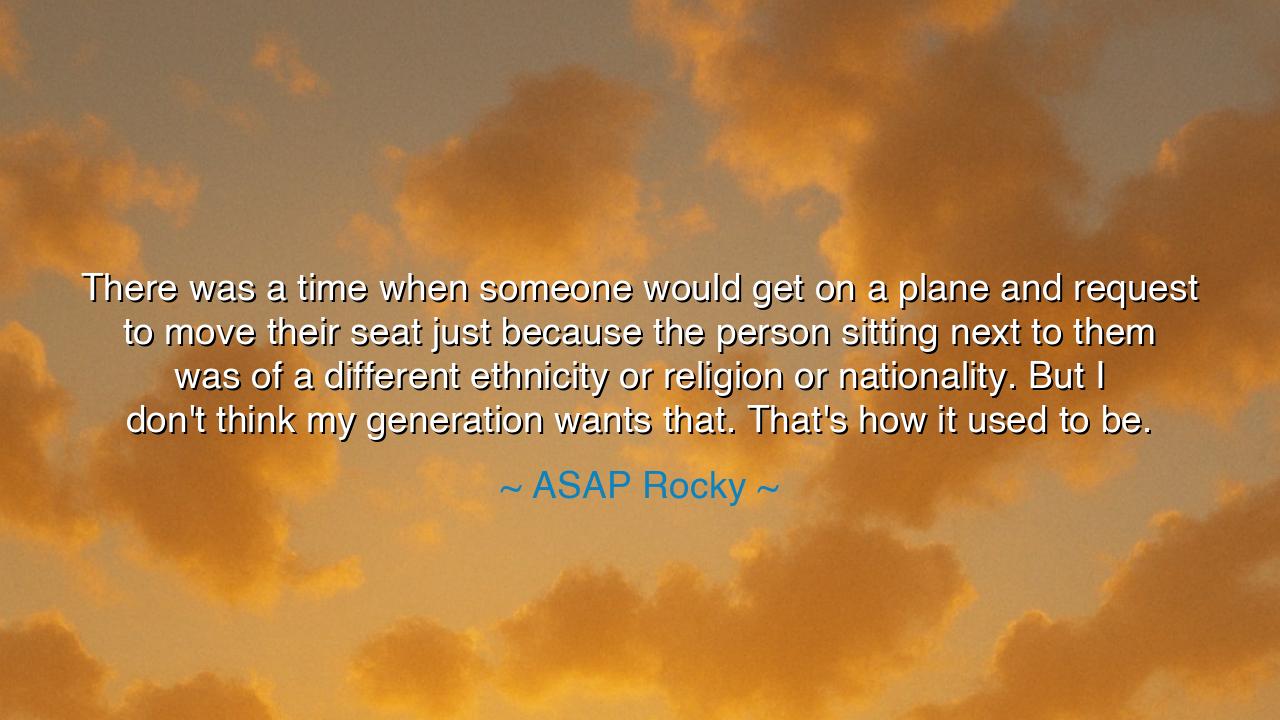
There was a time when someone would get on a plane and request to
There was a time when someone would get on a plane and request to move their seat just because the person sitting next to them was of a different ethnicity or religion or nationality. But I don't think my generation wants that. That's how it used to be.






ASAP Rocky, with the voice of one who has looked into the wounds of the past and the hopes of the future, declared: “There was a time when someone would get on a plane and request to move their seat just because the person sitting next to them was of a different ethnicity or religion or nationality. But I don’t think my generation wants that. That’s how it used to be.” These words strike like a trumpet, calling us to remember the chains of division while also heralding the dawn of unity. They remind us that once, men were bound by suspicion, fear, and pride, but now, a new spirit rises among the young—a spirit that seeks kinship instead of separation, fellowship instead of rejection.
In the days of old, nations and peoples often built walls higher than mountains and deeper than oceans, declaring “You are not of us, and so you must be cast aside.” The story of humanity is marred with such divisions: Jew against Gentile, Roman against barbarian, white against black. But in Rocky’s words shines the hope that this cycle need not continue, that ethnicity, religion, and nationality need not divide hearts forever. He speaks as a prophet of his time, saying, “That is how it used to be”—marking a line between past and present, between prejudice and possibility.
Consider the example of Jackie Robinson, who in 1947 broke the color barrier in Major League Baseball. Crowds mocked him, teammates rejected him, pitchers aimed fastballs at his head, and yet he endured. By sheer courage and dignity, he forced a nation to confront its own hatred. Robinson’s struggle mirrors the image Rocky evokes: a world where one’s place could be denied simply because of the color of skin or heritage of birth. But through endurance, the chains of exclusion were slowly weakened, and doors were forced open that others might walk through.
And yet, Rocky’s words are not only remembrance but prophecy. He speaks for a generation that hungers for something greater than prejudice. They crave music that unites, cultures that blend, friendships that cross borders. They no longer wish to change their seats out of fear—they wish to sit side by side, learning, listening, laughing together. In these words lies a heroism that is quiet yet mighty: the courage to treat every human being as kin, to reject the poison of division.
Still, O children of the future, beware! For though progress marches, the shadows of old hatreds linger. The heart of man can too easily return to bitterness if vigilance is forgotten. Racism, religious strife, and tribal pride still whisper in corners, waiting to divide again. Remember always that to honor Rocky’s vision, one must actively choose love over hate, unity over scorn, and understanding over suspicion. The past must not only be remembered—it must be overcome daily.
The lesson, then, is clear: do not allow the sins of the past to repeat themselves in your own heart. Sit beside those who are different from you and open your soul to learn from them. Break bread with strangers, and you will find they are not so strange. Teach your children that the worth of a man is not in his skin, nor in his nation, nor in the creed he chants, but in the light of his deeds and the truth of his heart.
Therefore, let this wisdom guide you: when you find yourself tempted to build walls, instead build bridges. When you feel the urge to recoil from difference, lean closer and discover the shared humanity within it. Let ethnicity, religion, and nationality be colors in a vast tapestry rather than chains of division. For this is the way of peace, the way of growth, the way of the future.
So rise, O listener, and live as Rocky envisions—unbound by the chains of yesterday, alive in the harmony of today, and faithful in building the unity of tomorrow. And when you sit beside a stranger, remember: he is not the “other,” but your brother. She is not your rival, but your sister. That is how it must be—if the world is to endure, and if love is to reign.






AAdministratorAdministrator
Welcome, honored guests. Please leave a comment, we will respond soon